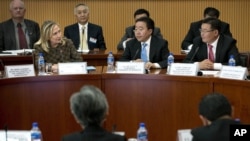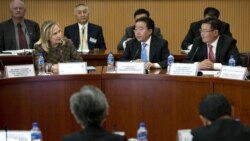“True democracy -- real freedom – is hard work,” U.S. President Barack Obama told the United Nations General Assembly in late September. Today, more nations than ever before are experiencing that hard work first hand. Many of these emerging democracies and civil society groups worldwide are receiving help from the Community of Democracies.
The Community of Democracies was founded in 2000 by then U.S. Secretary of State Madeleine Albright and Polish Foreign Minister Bronislaw Geremek with the goal of uniting governments and activists in support of democracy around the world.
“It’s the only organization of its type,” said Senior Advisor for Civil Society and Emerging Democracies Tomicah Tillemann. In recent years the Community has evolved, transforming itself from a forum for discussion to a platform to get things done, said Dr. Tillemann:
“That transformation from an aspirational organization to an operational organization could not have come at a better time. This is a moment when a wave of new democracies are putting down roots around the world and we need multi-lateral bodies that can strengthen those governments and also the civil society organizations in these nations that will make the difference ultimately between their success or failure.”
Over the last year, country-specific task forces have channeled assistance from governments and civil society to bolster emerging democracies in Tunisia and Moldova. Issue-based working groups have worked to coordinate diplomatic action to defend civil society against the passage of restrictive laws.
“Working together the organizations and governments participating … have been able to push back against draft legislation that’s been under consideration around the world and in now numerous instances either have that legislation revised to a point where it no longer poses a danger to civil society or have it shelved completely.”
The Community of Democracies has provided leaders in young democracies with new technologies to facilitate cooperation and innovation. And, they’ve bolstered civic education to help countries strengthen adherence to democratic norms. The CD has also announced plans for a new Working Group focused on the UN Human Rights Council in Geneva.
At the last meeting of the Governing Council in July, the U.S. pledged up to $1 million in support of the Community of Democracies, including half a million dollars to the organization’s Permanent Secretariat.
“The Obama administration is deeply committed to advancing democracy around the world,” said Dr. Tillemann. Supporting the Community of Democracies helps with the “hard work”.
The Community of Democracies was founded in 2000 by then U.S. Secretary of State Madeleine Albright and Polish Foreign Minister Bronislaw Geremek with the goal of uniting governments and activists in support of democracy around the world.
“It’s the only organization of its type,” said Senior Advisor for Civil Society and Emerging Democracies Tomicah Tillemann. In recent years the Community has evolved, transforming itself from a forum for discussion to a platform to get things done, said Dr. Tillemann:
“That transformation from an aspirational organization to an operational organization could not have come at a better time. This is a moment when a wave of new democracies are putting down roots around the world and we need multi-lateral bodies that can strengthen those governments and also the civil society organizations in these nations that will make the difference ultimately between their success or failure.”
Over the last year, country-specific task forces have channeled assistance from governments and civil society to bolster emerging democracies in Tunisia and Moldova. Issue-based working groups have worked to coordinate diplomatic action to defend civil society against the passage of restrictive laws.
“Working together the organizations and governments participating … have been able to push back against draft legislation that’s been under consideration around the world and in now numerous instances either have that legislation revised to a point where it no longer poses a danger to civil society or have it shelved completely.”
The Community of Democracies has provided leaders in young democracies with new technologies to facilitate cooperation and innovation. And, they’ve bolstered civic education to help countries strengthen adherence to democratic norms. The CD has also announced plans for a new Working Group focused on the UN Human Rights Council in Geneva.
At the last meeting of the Governing Council in July, the U.S. pledged up to $1 million in support of the Community of Democracies, including half a million dollars to the organization’s Permanent Secretariat.
“The Obama administration is deeply committed to advancing democracy around the world,” said Dr. Tillemann. Supporting the Community of Democracies helps with the “hard work”.






